COVID Relief Phase-I
Relief support: Immediately after the outbreak of COVID pandemic situation MARI made a voluntary effort to assess the effect of the same on the poor and vulnerable communities and realized the urgency to provide relief support in the form of basic food commodities, hygiene and protective material to keep safe from COVID.
The Relief support was Initiated on April 9, 2020 and concluded on January 15th 2021.
Beneficiaries :
• 8,309 Families in slums
• 1,500 Homeless
• 1,000 Frontline Sanitation Workers
• 700 Orphan and destitute children
• Beneficiary population Groups:
• Poor living in urban slums
• Petty vendors
• Artisanal and occupational groups like barbers
• Auto drivers, Domestic help workers
• Daily wagers
• Differently-abled
• Frontline sanitation workers
• Migrant labourers
• Orphans and Urban homeless
• Transgender and LGBT community
Donors: Azim Premji Philanthropy Initiative (APPI); Ernst & Young Foundation; Care & Share Italia; Oxfam (in cash and in kind); APMAS (in kind).
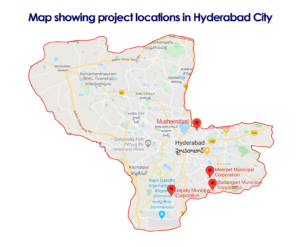
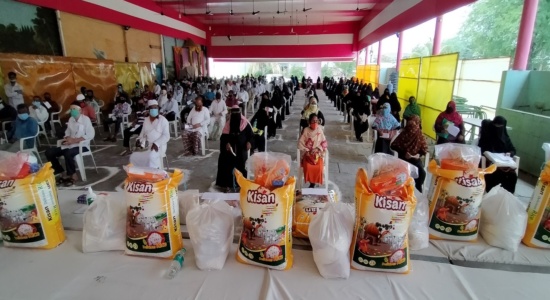
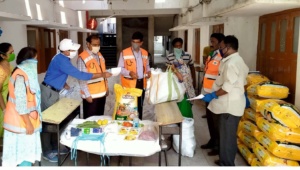
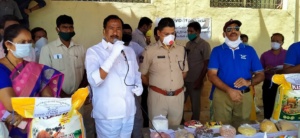
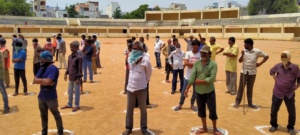
MARI was part of state level Health advocacy group that was constantly sharing information and raise key advocacy messages to suggest Government and other stakeholders on the action required for prevention and control of COVID-19. MARI was part of the group that represented the issues to the state Health Minister, high level COVID control task team set up by the Chief Minister and also represented local issues several times to the concerned elected representatives and officials in the Health department and GHMC.
Organized FGDs through one to one interaction with members of 5 Vulnerable Groups (Urban shanty dwellers, Homeless, PWDs, Sanitation workers and People living in Hard to reach / remote / tribal / disaster prone areas): This was implemented as part of South Asia level common activity lead by Freshwater Action Network South Asia (FANSA). The activity was aimed at gathering evidence on the status of access to WASH services for the five vulnerable communities during the COVID-19 pandemic situation and also identify the issues as well as best practices with respect to realization of WASH commitments to these communities.
Research study on Situational analysis of vulnerable and marginalized groups during the COVID-19 pandemic, focusing on the Sanitation workers and Persons with disability: Under the leadership of UNRC in India, a special initiative has been made to conduct a comprehensive socio-economic situational analysis of different vulnerable groups. MARI as hosting organization of FANSA took the lead responsibility and carried out the study on socio-economic situation analysis of persons with disabilities (PWDs) and frontline Sanitation Workers. The PWD study was carried out with a sample of 1,111 respondents selected from the five states of Jharkhand, Maharashtra, Odisha, Telangana and Uttar Pradesh in India. The study on sanitation workers was done with a sample size of 2091 respondents drawn from 10 states which included, Bihar, Delhi, Gujarat, Jharkhand, Karnataka, Maharastra, Odhisha, Tamilnadu, Telangana and Uttar Pradesh.
For more information https://mari-india.org/wp-content/uploads/2021/05/COVID-Relief-learning-document-24112020.pdf
COVID Phase-2
Interventions to Strengthen Community Preparedness for Prevention and Control of COVID-19 in Hyderabad : 16th August ‘20 -15th January ‘21
Outreach:
Four Urban Primary Health Centers (Musheerabad, Bholakpur, Bible House and Balanagar) in the city of Hyderabad covering about 11072 households having about 50,000 population
Key Interventions and results achieved:
- Awareness promotion, safe behavioural practices – Dissemination of key messages, IEC material and promoting Community Champions for community mobilization towards strengthening preparedness for prevention and control of COVID
- Referral and counselling services- Improving logistics at UPHCs, support for RT-PCR tests, Deployment of Counsellors, providing dry ration support to poor families with persons tested positive, Tele-medical helpline, provided emergency medicines and ambulance services,
- PROVIDED Essential personnel safety MATERIAL and community-level monitoring : PPE kits, face masks, Oxymeters, IR thermometers, medicines, staff insurance.
- Capacity building of frontline staff of urban health centres on COVID prevention and control measures to be promoted and advocated at community level
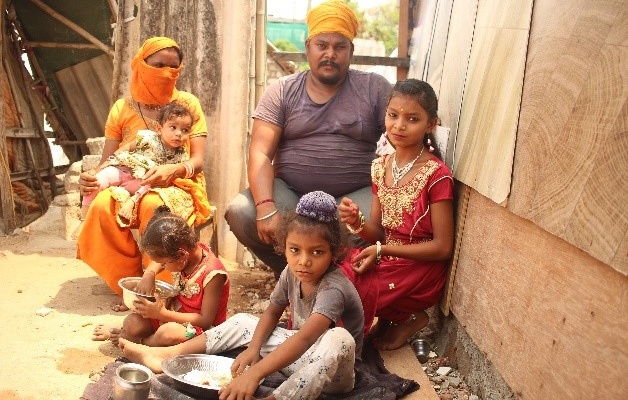
COVID Response – Phase-3 – Ongoing since 5th May ‘21
Outreach: 10,000 families with about 55,000 population in slums and low income settlements of Hyderabad city in Telangana
Frontend Support: Deployment of additional Human Resources to increase service delivery efficiency of nine PHCs for COVID testing, treatment, tracking positive cases and vaccination. Providing Dry ration and Hygiene kits to poorest and most vulnerable families with COVID positive persons in home isolation
Medical Help: Tele Medical care services to those tested positive and Providing emergency COVID treatment medicines, Ambulance and Oxygen services to the poorest and most vulnerable lacking affordability and access to these essential requirements
Help desks in Five major Government COVID Treatment Hospitals:
1. Gandhi General Hospital
2. Osmania General Hospital
3. King Koti Hospital
4. TIMs Hospital
5. Government Chest Hospital.
Training of ASHA workers and Project staff of MARI
Communications and Campaigns: Booklet on COVID management- All basic awareness information, precautions, home isolation management, all about vaccination. Campaign for mobilizing people for vaccination and coordinated effort to ensure full coverage of target population
Government partnerships/relationships: Convergence, Coordination and Advocacy Meetings at PHC level. Fact sheets and critical situational analysis reporting based on the ground realities to suggest for timely and appropriate interventions from the Government for better prevention and control of COVID and particularly to protect health and livelihoods of the poor and vulnerable communities

